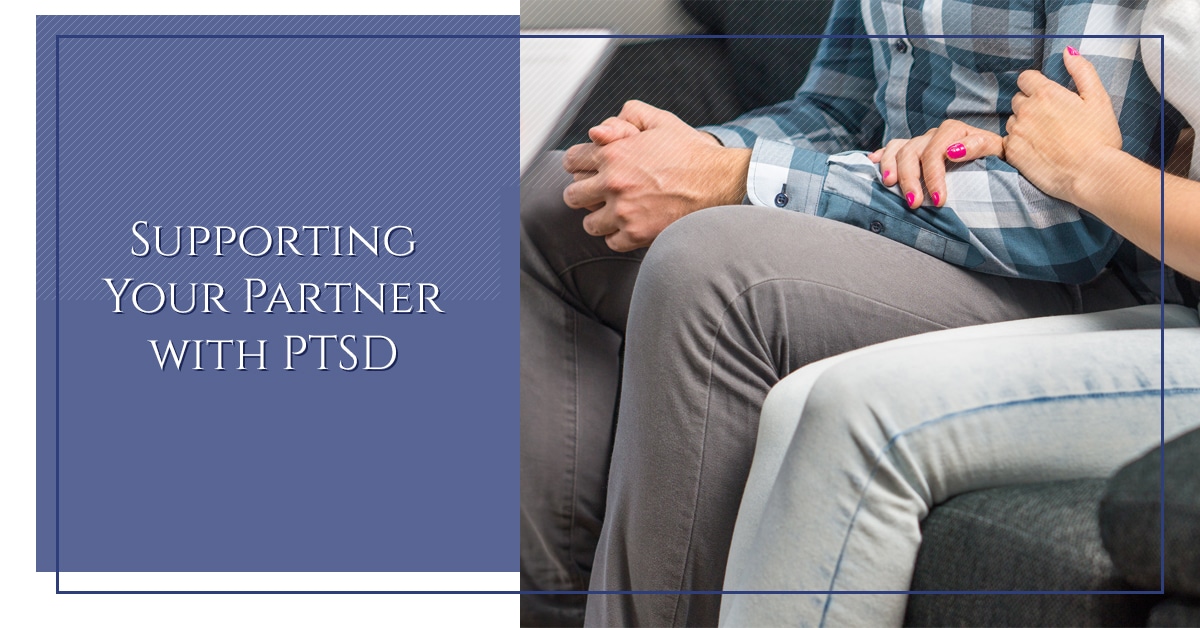
Post-traumatic stress disorder (PTSD) is a mental health condition that develops after experiencing a traumatic event. If your partner is experiencing PTSD, you may be at a loss for how to help them navigate the difficult symptoms of this disorder. In this blog, we will go over ways you can support your partner with PTSD.

UNDERSTAND PTSD
PTSD can make people behave in such a way that seems irrational or inexplicable. They may withdraw emotionally, become irritable or paranoid, or act in a volatile or unpredictable way. Their loved ones often feel frustrated and confused by their behavior, and may even start to experience symptoms of trauma themselves. It can be helpful to keep in mind that your partner may not entirely understand their behavior either, so it’s best to give them the benefit of the doubt to create a supportive environment.
ACTIVELY LISTEN
Trauma is difficult to talk about, so don’t push your partner to open up. This can backfire and make it even more difficult to heal. Let your partner know that you are there for them if they want to talk about it, but they don’t have to if they don’t want to. Be patient so that your partner can gradually feel comfortable talking openly about the traumatic incident. When they are able to open up, give them your full attention, listen without judgment, and don’t give them advice.
HELP THEM SOCIALIZE
It’s common for people with PTSD to also experience social anxiety disorder. Because people with PTSD often feel the need to withdraw from others, they can feel isolated from the world. They may also lose interest in their hobbies and avoid social situations. This is not because they don’t care; it’s because they’re in pain. While you should respect their boundaries, gently encourage your partner to engage with social activities and hobbies that give them pleasure. Social connection is an integral part of healing, so see if you can help your partner stay connected.
SUPPORT THEIR TREATMENT
It’s important for people with PTSD to seek treatment. Support them by encouraging them to go to therapy and to use other self-care tools to cope. Help them connect with a therapist who specializes in trauma and can help them with certain therapeutic techniques. For example, cognitive behavioral therapy has shown to be effective in treating PTSD. In addition, they may benefit from breathing techniques, meditation, yoga, or support groups. Whatever works for them, make sure you support and encourage them.
BE SECURE AND TRUSTWORTHY
When a person experiences trauma, they lose their ability to trust both others and themselves. They may always feel unsafe in the world. You can help them by making your relationship a safe and reliable haven for them. Do this by keeping your promises, staying committed to the relationship, and making plans for the future that include them can all make your partner feel more secure.
RECOGNIZE THEIR TRIGGERS
Part of the journey of healing from PTSD is recognizing your triggers, meaning the things that cause distress and flashbacks. This may be certain places, sights, sounds, or situations. Knowing your partner’s triggers and making a plan of action for when they are triggered can go a long way towards helping them develop coping skills for these times.
It’s not always easy to be in a relationship with someone with PTSD, but educating yourself about the disorder can make it a lot easier to meet them where they are. If you think you may benefit from couples therapy in Palatine, we can help. Contact New Transitions Counseling Center for a phone consultation today.

